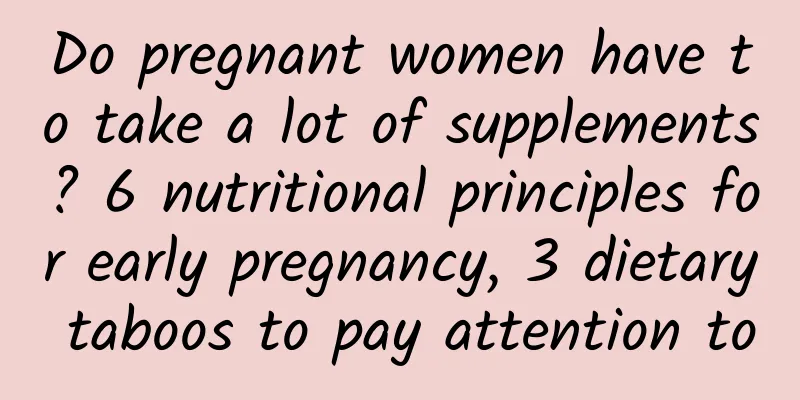Do pregnant women have to take a lot of supplements? 6 nutritional principles for early pregnancy, 3 dietary taboos to pay attention to

|
During the pregnancy process, the pregnant mother herself needs nutrients to maintain her health. As a baby grows from a fertilized egg to an embryo and into a fetus, it forms the body's nerves, muscles, internal organs and bones, and requires various nutrients to develop healthily. Therefore, some pregnant mothers, from the moment they know they are pregnant, think that they are eating for both, and start taking a lot of supplements. But is this really the right way to get nutrition? What should you eat in the early stages of pregnancy to be good for both the pregnant mother and the baby? 6 principles of nutrition during pregnancyI believe that every pregnant mother is very concerned about every bite of food she eats, knowing that these foods affect her health and the development of her baby. What dietary intake should you pay attention to during the early stages of pregnancy, also known as the first trimester (from the 1st to 12th week of pregnancy)? The National Health Service provides 6 principles of nutrition during pregnancy for pregnant mothers to refer to: 1. Eat more green leafy vegetables to supplement folic acid, which is essential for pregnancy Folic acid is related to the neural development of the fetus and needs to be supplemented from the fertilized egg, embryo to the fetal stage. If there is a lack of folic acid, the fetus may suffer from neural tube defects. Pregnant mothers can eat more dark green vegetables rich in folic acid, such as spinach, rapeseed and bok choy, liver, soy products and citrus fruits. Nutritionist Zhong Peishan from Ruizhimeng Nutrition Agency recommends eating green vegetables or soy products at every meal, drinking soy milk in the morning, and eating vegetables and fruits for lunch and dinner. Nutritionist Zhong Peishan pointed out that 25% of people in Asia have the folate MTHFR gene mutation, which means that the conversion of folate into a form that can be absorbed by the human body is affected. Blood tests and genetic tests can be used to understand whether the body has enough folate. 2. Choose iodized salt and iodized foods to supplement the iodine needed by the body Iodine can affect fetal brain development, newborn growth and neurodevelopment. During pregnancy, it is recommended to choose iodized salt instead of ordinary salt, and eat more iodine-containing foods, such as kelp, seaweed and other seaweed foods, to supplement the iodine needed by the body. Nutritionist Zhong Peishan reminds that if you have thyroid-related diseases, please consult a doctor and nutritionist to make dietary adjustments. Pregnant mothers can eat more dark green vegetables rich in folic acid, such as spinach, rapeseed and bok choy, liver, soy products and citrus fruits. 3. It is very important to supplement iron during pregnancy and eat more iron-rich foods Iron is an important element for producing maternal and fetal hemoglobin, and is stored in large quantities in the fetus for use after the baby is born. Therefore, the need for iron increases from the beginning of pregnancy. You can consume more iron-rich foods, such as seafood such as clams, octopus, oysters, liver, egg yolks, red meat, and dark vegetables such as amaranth, seaweed, and red amaranth. Nutritionist Zhong Peishan said that iron is better absorbed from animal sources, with an absorption rate of about 20-30%, while the absorption rate of plant sources is about 5%. Vegetarian pregnant mothers can eat fresh fruits rich in vitamin C (such as guava, kiwi, sugar apple, papaya, passion fruit, etc.) after meals to promote the absorption of iron in the intestines. 4. Calcium is important for baby growth. Dairy products and soy products can supplement it. The fetus will form bones in the mother's body to prevent cramps, so calcium is an indispensable nutrient during pregnancy. It is recommended to consume calcium-rich foods, such as fresh milk, milk powder, cheese, yogurt, dairy products, dried fish, and traditional tofu, dried tofu and other soy products to meet the baby's growth and the mother's needs. Nutritionist Zhong Peishan mentioned that the calcium content of soy products such as soy milk, soft tofu, and bean curd is actually very low, and it is not recommended to be used as the main source of calcium; two cups of milk a day (one cup is 240c.c.) can meet half of the daily calcium requirement. 5. Moderate sun exposure and consumption of fish, eggs and milk to supplement vitamin D Sufficient vitamin D can help calcium absorption. Vitamin D is mainly produced by the skin through sunlight. When the sun is sufficient but not the strongest, expose your face, arms and other parts of the body to moderate sunlight for 15 minutes a day to help the body synthesize sufficient vitamin D. And eat more foods rich in vitamin D, such as milk, fish, eggs, milk fortified with vitamin D, black fungus, shiitake mushrooms, etc. Nutritionist Zhong Peishan added that milk and dairy products are the most convenient food sources and are rich in calcium and vitamin D. In addition, if you want to know whether your vitamin D level is sufficient, you can draw blood to find out the body's value. 6. Vegetarian pregnant mothers should pay attention to additional vitamin B-12 supplementation A lack of vitamin B-12 may lead to neurological defects in the fetus. Foods of animal origin such as liver, meat, milk, and eggs are rich in vitamin B-12. Vegan pregnant mothers should pay attention to additional supplementation of vitamin B-12, which can be obtained from seaweed, kelp, and brown rice. Vitamin B-12 can also be measured by blood drawing to determine whether the body's levels are sufficient. Food sources of nutrients during pregnancy1. Folic acid: dark green vegetables, liver, soy products, citrus fruits 2. Iodine: iodized salt, kelp, seaweed, shellfish, and marine fish 3. Iron: liver, egg yolks, red meat, whole grains, dark green vegetables 4. Calcium: milk and dairy products, traditional tofu, dried fish, green vegetables 5. Vitamin D: milk and dairy products, fish, eggs, black fungus, mushrooms 6. Vitamin B-6: Brown rice, liver, fish, beef, milk 7. Vitamin B-12: liver, meat, milk, eggs, seaweed, kelp How to relieve the discomfort of morning sickness?Some pregnant women may experience nausea and vomiting in the early stages of pregnancy due to factors such as hormones, metabolism, emotions or fasting. Nutritionist Zhong Peishan recommends eating some soda crackers, toast or steamed buns after getting up. If you can't eat, you should still eat small meals frequently to avoid going hungry. Avoid greasy, heavy, or heavily seasoned foods, and do not drink large amounts of soup or water after meals. You can also take vitamin B-6 to relieve morning sickness, such as in brown rice, liver, fish, beef, milk, or by taking nutritional supplements directly. In addition, gargling with water after morning sickness can also remove the feeling of nausea. Pay attention to these dietary taboos during pregnancyDuring the first trimester, the embryo is in the formation stage and does not require much nutrition, so the calorie requirement does not need to be increased significantly. If you consume too many calories at this time, it will only increase the calories for the pregnant mother herself. Nutritionist Zhong Peishan recommends that as long as you have a balanced diet, use natural foods as the main source of nutrition, and obtain different sources of nutrition through the combination of different ingredients. After understanding the nutrients that need to be supplemented during pregnancy, what are the foods that should be reduced or avoided during pregnancy? 1. Drinking alcohol directly should be absolutely avoided! During pregnancy, drinking any amount of alcohol can pose health risks. In addition to possibly causing miscarriage, early placental abruption and stillbirth, it will also affect the growth of the fetus, making it easier to give birth to babies with "fetal alcohol syndrome" who have health problems such as abnormal facial development, growth retardation and central nervous system abnormalities. As for rice wine dishes that have been cooked, can pregnant mothers eat them? Nutritionist Zhong Peishan pointed out that although rice wine dishes have been processed, they are not recommended for pregnant mothers to eat them without confirming that the alcohol has completely evaporated. If you accidentally ingest a little bit, please don’t worry too much. It is generally recommended that pregnant mothers should not consume more than 200 mg of caffeine a day, but everyone's physical condition is different. Can they drink coffee? And how much coffee should they drink during pregnancy? It is safer to consult a doctor and follow his advice. 2. A small amount of caffeine is acceptable! A cup of coffee every day seems to be the start of many people's day. It is generally recommended that pregnant mothers do not consume more than 200 mg of caffeine a day, but everyone's physique is different. Can you drink coffee and how much coffee should you drink during pregnancy? It is safer to consult a doctor and follow his advice. 3. Eating raw food may cause infection! Should pregnant mothers avoid eating raw foods such as sashimi and lettuce? According to the Centers for Disease Control, listeriosis is mainly transmitted through eating contaminated food. Eating raw food carries the risk of Listeria infection. Therefore, it is recommended that during pregnancy, you should avoid eating raw food such as sashimi and lettuce, or heat it thoroughly before eating. Nutritionist Zhong Peishan reminds us to pay special attention to the hot summer or when raw and cooked food are mixed together, as Vibrio enteritidis can easily breed. Symptoms of contamination from eating raw seafood are mostly gastrointestinal vomiting, diarrhea, abdominal pain and other discomforts. Pregnant mothers should pay more attention. In addition, pregnant mothers should avoid consuming too much high-fat food, such as fatty meat and fried food, and also reduce the intake of processed foods such as candy and soda to avoid increasing the burden on the body. Interview and writing by Chen Xuanping Consultation / Nutritionist Zhong Peishan from Ruizhimeng Nutrition Agency Reference material/Health education manual for pregnant women Eat right for a healthy pregnancy - a health handbook for all moms For the full content, please see: [Baby and Mother] |
>>: A female nutritionist who weighs nearly 100 kg lost 8 kg by fasting 2 days a week.
Recommend
Ensuring that patients rest is an important consideration for chronic cervicitis
Due to the high incidence of chronic cervicitis, ...
Nursing methods for hyperprolactinemia
When it comes to hyperprolactinemia, many female ...
What is the cause of uremia?
What is the cause of uremia? The causes of uremia...
What are the causes of menopausal syndrome?
Menopausal syndrome is a common disease that ofte...
Do pregnant women have to take a lot of supplements? 6 nutritional principles for early pregnancy, 3 dietary taboos to pay attention to
During the pregnancy process, the pregnant mother...
Will endometriosis recur after surgery?
Endometriosis has caused infertility problems for...
Does pelvic effusion need treatment?
The treatment of pelvic effusion depends on the c...
Expert brief: Several common symptoms of pelvic inflammatory disease
Pelvic inflammatory disease is a gynecological di...
What are the causes of cervicitis?
Have you ever heard of cervicitis? How much do yo...
Will unmarried women undergoing cervical erosion surgery affect pregnancy? Things women must know about cervical erosion surgery
In principle, it is not recommended for women who...
Briefly introduce some causes of ectopic pregnancy
Many women may experience ectopic pregnancy durin...
A man’s charm is not just about his face! 2 tips to create sexy buttocks
[The first move - lift your hips and stretch one ...
Uterine fibroids can cause infertility
Uterine fibroids are the most common benign tumor...
What are the symptoms of cervical erosion? 4 common symptoms of cervical erosion
The main symptoms and phenomena of cervical erosi...
What fruits are afraid of uterine fibroids?
The fruits that uterine fibroids are afraid of re...









